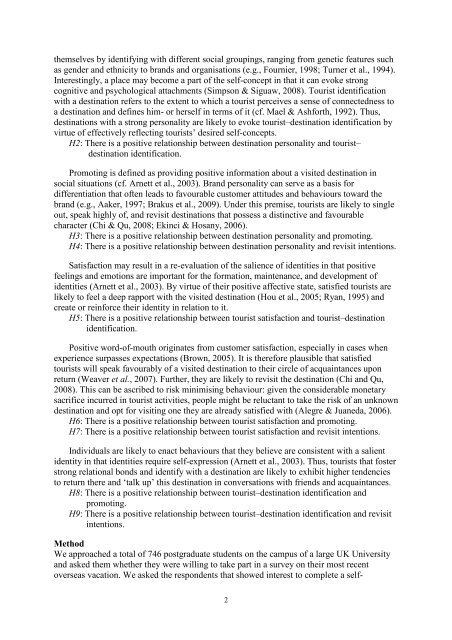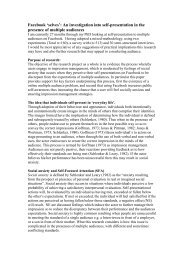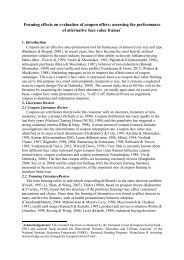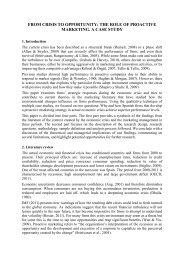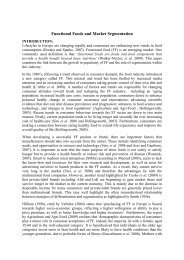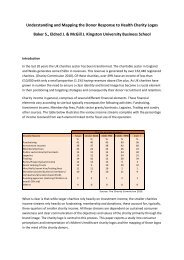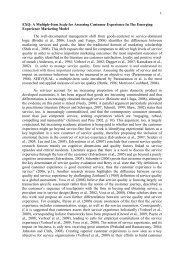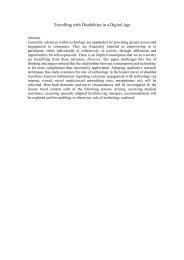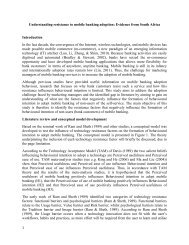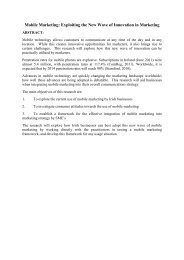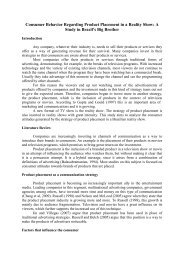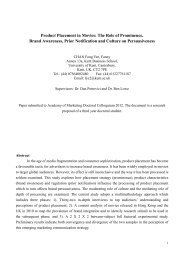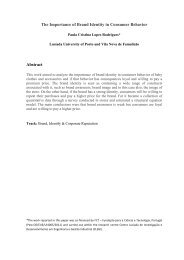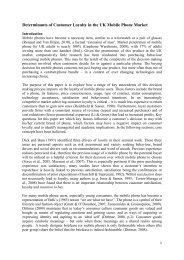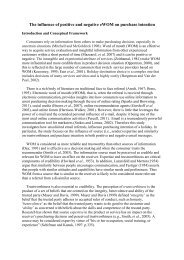Destination Personality: Effects on Satisfaction, Identification, Word-of
Destination Personality: Effects on Satisfaction, Identification, Word-of
Destination Personality: Effects on Satisfaction, Identification, Word-of
Create successful ePaper yourself
Turn your PDF publications into a flip-book with our unique Google optimized e-Paper software.
themselves by identifying with different social groupings, ranging from genetic features such<br />
as gender and ethnicity to brands and organisati<strong>on</strong>s (e.g., Fournier, 1998; Turner et al., 1994).<br />
Interestingly, a place may become a part <strong>of</strong> the self-c<strong>on</strong>cept in that it can evoke str<strong>on</strong>g<br />
cognitive and psychological attachments (Simps<strong>on</strong> & Siguaw, 2008). Tourist identificati<strong>on</strong><br />
with a destinati<strong>on</strong> refers to the extent to which a tourist perceives a sense <strong>of</strong> c<strong>on</strong>nectedness to<br />
a destinati<strong>on</strong> and defines him- or herself in terms <strong>of</strong> it (cf. Mael & Ashforth, 1992). Thus,<br />
destinati<strong>on</strong>s with a str<strong>on</strong>g pers<strong>on</strong>ality are likely to evoke tourist–destinati<strong>on</strong> identificati<strong>on</strong> by<br />
virtue <strong>of</strong> effectively reflecting tourists’ desired self-c<strong>on</strong>cepts.<br />
H2: There is a positive relati<strong>on</strong>ship between destinati<strong>on</strong> pers<strong>on</strong>ality and tourist–<br />
destinati<strong>on</strong> identificati<strong>on</strong>.<br />
Promoting is defined as providing positive informati<strong>on</strong> about a visited destinati<strong>on</strong> in<br />
social situati<strong>on</strong>s (cf. Arnett et al., 2003). Brand pers<strong>on</strong>ality can serve as a basis for<br />
differentiati<strong>on</strong> that <strong>of</strong>ten leads to favourable customer attitudes and behaviours toward the<br />
brand (e.g., Aaker, 1997; Brakus et al., 2009). Under this premise, tourists are likely to single<br />
out, speak highly <strong>of</strong>, and revisit destinati<strong>on</strong>s that possess a distinctive and favourable<br />
character (Chi & Qu, 2008; Ekinci & Hosany, 2006).<br />
H3: There is a positive relati<strong>on</strong>ship between destinati<strong>on</strong> pers<strong>on</strong>ality and promoting.<br />
H4: There is a positive relati<strong>on</strong>ship between destinati<strong>on</strong> pers<strong>on</strong>ality and revisit intenti<strong>on</strong>s.<br />
Satisfacti<strong>on</strong> may result in a re-evaluati<strong>on</strong> <strong>of</strong> the salience <strong>of</strong> identities in that positive<br />
feelings and emoti<strong>on</strong>s are important for the formati<strong>on</strong>, maintenance, and development <strong>of</strong><br />
identities (Arnett et al., 2003). By virtue <strong>of</strong> their positive affective state, satisfied tourists are<br />
likely to feel a deep rapport with the visited destinati<strong>on</strong> (Hou et al., 2005; Ryan, 1995) and<br />
create or reinforce their identity in relati<strong>on</strong> to it.<br />
H5: There is a positive relati<strong>on</strong>ship between tourist satisfacti<strong>on</strong> and tourist–destinati<strong>on</strong><br />
identificati<strong>on</strong>.<br />
Positive word-<strong>of</strong>-mouth originates from customer satisfacti<strong>on</strong>, especially in cases when<br />
experience surpasses expectati<strong>on</strong>s (Brown, 2005). It is therefore plausible that satisfied<br />
tourists will speak favourably <strong>of</strong> a visited destinati<strong>on</strong> to their circle <strong>of</strong> acquaintances up<strong>on</strong><br />
return (Weaver et al., 2007). Further, they are likely to revisit the destinati<strong>on</strong> (Chi and Qu,<br />
2008). This can be ascribed to risk minimising behaviour: given the c<strong>on</strong>siderable m<strong>on</strong>etary<br />
sacrifice incurred in tourist activities, people might be reluctant to take the risk <strong>of</strong> an unknown<br />
destinati<strong>on</strong> and opt for visiting <strong>on</strong>e they are already satisfied with (Alegre & Juaneda, 2006).<br />
H6: There is a positive relati<strong>on</strong>ship between tourist satisfacti<strong>on</strong> and promoting.<br />
H7: There is a positive relati<strong>on</strong>ship between tourist satisfacti<strong>on</strong> and revisit intenti<strong>on</strong>s.<br />
Individuals are likely to enact behaviours that they believe are c<strong>on</strong>sistent with a salient<br />
identity in that identities require self-expressi<strong>on</strong> (Arnett et al., 2003). Thus, tourists that foster<br />
str<strong>on</strong>g relati<strong>on</strong>al b<strong>on</strong>ds and identify with a destinati<strong>on</strong> are likely to exhibit higher tendencies<br />
to return there and ‘talk up’ this destinati<strong>on</strong> in c<strong>on</strong>versati<strong>on</strong>s with friends and acquaintances.<br />
H8: There is a positive relati<strong>on</strong>ship between tourist–destinati<strong>on</strong> identificati<strong>on</strong> and<br />
promoting.<br />
H9: There is a positive relati<strong>on</strong>ship between tourist–destinati<strong>on</strong> identificati<strong>on</strong> and revisit<br />
intenti<strong>on</strong>s.<br />
Method<br />
We approached a total <strong>of</strong> 746 postgraduate students <strong>on</strong> the campus <strong>of</strong> a large UK University<br />
and asked them whether they were willing to take part in a survey <strong>on</strong> their most recent<br />
overseas vacati<strong>on</strong>. We asked the resp<strong>on</strong>dents that showed interest to complete a self-<br />
2


